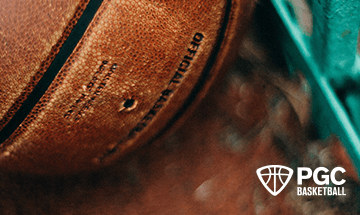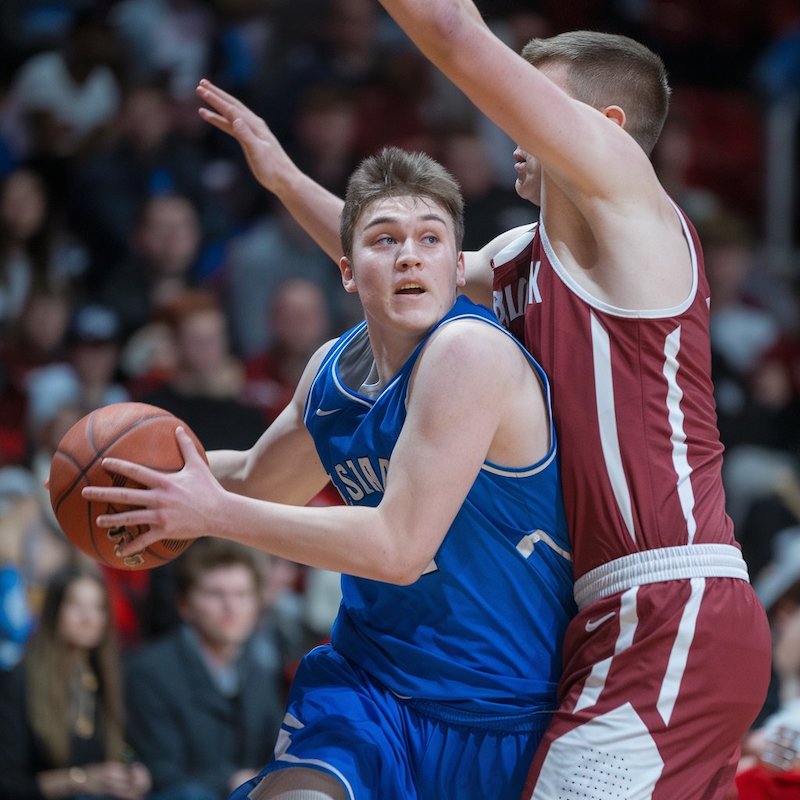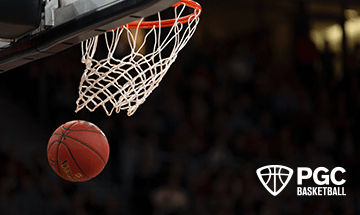Why Apply Constant Defensive Pressure?
Effective pressure is continuous, not on-again off-again. But being continuously on your man (in man pressure) or being able to get someone quickly on the ball (and people quickly in the prime receiving areas in zone pressure) takes a lot of effort and intelligence. A quick dart-out to steal should not be confused with pressure. That is a quick dart-out to steal. That’s all. If you get it, fine. If you don’t get it, though, you let the other team off the hook and enable them to relax and get their confidence. Pressure, to be effective, must be continuous action.
It must not be attempts to steal but constant threats to steal. Almost all players will make a mistake if you give them the opportunity. Very few basketball players, for example, are comfortable dribbling in a crowd with their weak, usually left, hand. A dribble now and then with the weak hand they will accomplish nicely. But being forced to keep the ball there is another story. If you can keep the ball in your man’s weak hand, he will very likely make a mistake, providing his teammates are not wide open for passes.
The reason continuous pressure is effective is that basketball players are very instinctive. They will throw passes they should not throw or dribble places they should not dribble, if they can be forced to do several things in a series rather than one thing at a time in exactly the way their coach went over it in practice.
If they get a chance to sprint out to the ball, then make a good pass after a dribble or two, they are likely to be able to do just what their coach has taught. However, if they come out for the ball and they aren’t free, they have to think about options and movements they are less accustomed to. The more things you make them do, the more tired they get, and the more their concentration slips.
Read More: How to Get in Basketball Shape
To apply effective pressure, you have to have the energy to make it continuously difficult for the offense. By doing this, your weaknesses, which every pressure defense has, will not be exploited. In zone pressure, there are always offensive players open, but if you hustle, get to the ball, distract the passer and force him to turn his back to one side, the open men are no longer able to get the ball.
Like so much of basketball, this is common sense, but it is a sense that players often fail to employ during a tight game. For example, players needing the ball at the end of a game, five points behind with several minutes left, often let their man get the ball and then get up in the man’s face. If you let your man get the ball with ease, that means he will be collected and ready to burst ahead when he needs to pass you on a dribble. He is only likely to dribble carelessly or throw a pass poorly if he has had to work to get the ball. If he has to work for the ball, he has no time to collect himself, he is tired, he is irritated by you and his teammates are not precisely where the coach told them to be (and where they were) yesterday in practice.
Although sometimes you may feel as though your effort is in vain, continuous pressure pays big dividends. Teams will throw the ball away if defenders stay close. If you make every pass difficult, every dribble worrisome, you won’t have to go for a steal. The other team will make a mistake for you; your concern need not be with when or how. Just apply the pressure and wait.
If you need a steal now, pressure defense is not what you are talking about. That is risky, steal-now defense. Pressure is “slapping some heat on ’em” and keeping it there. Off again on again is not pressure. Many poor players can handle that kind of situation with ease. Do it, rest, do it, rest…is just the kind of rhythm a poor player needs. To apply pressure, you make every phase of the game difficult and you wait. A mistake will occur soon.
Related Articles
#1 Thing College Basketball Coaches Hate in a Recruit
A short while back on a PGC mentorship Zoom call, a player asked Yale Women’s Assistant Coach, Amber Raisner, “what’s the #1 thing you look for when deciding who NOT to recruit for your team?” Click to get the answer
5 Habits That Can Make Undersized Point Guards Unstoppable
When it comes to basketball, size isn’t everything. For undersized point guards, mastering specific skills and habits can not only level the playing field but also make them truly unstoppable.
How To Win The Inner-Game of Basketball (and Life)
As a basketball player, just like so many other walks of life, players do not operate at max capacity because they are extremely hard on themselves and are losing the ‘inner game.’
About PGC
PGC Basketball provides intense, no-nonsense basketball training for players and coaches. Our basketball camps are designed to teach players of all positions to play smart basketball, be coaches on the court, and be leaders in practices, games and in everyday life.
We combine our unique PGC culture with a variety of teaching methods and learning environments to maximize the learning potential of those that attend our sessions. In addition to spending 6-7 hours on the court each day, lessons will be reinforced through classroom sessions and video analysis.
Our goal at PGC is to empower you with the tools to fulfill your basketball dreams, while also assisting you in experiencing the joy of the journey.
To learn more about PGC Basketball, including additional basketball training tips and videos, visit our YouTube Channel or find us on Facebook, Instagram, and Twitter.













Share This Post